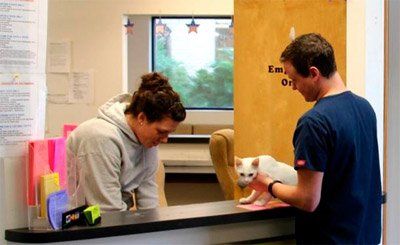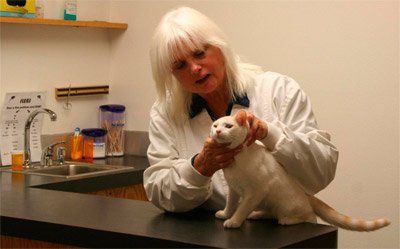Lisa Beitler, DVM
Mark Royer, DVM
Holly Bartels, DVM
Joey Durr, DVM
Heath Belk, DVM
Chris Kurtz, DVM
Gregory Strand, DVM

Vaccinations against certain contagious diseases are one of the best investments you can make regarding the health of your cat. Not administering all temporary vaccinations is dangerous, because your kitten will go unprotected during its most vulnerable time. Kittens are not capable of developing long-lasting immunities, so this series of vaccinations provides overlapping immunity.
General vaccination schedule
- 4-7 weeks of age – de-worm only
- 7-9 weeks of age – temporary DRC
- 9-13 weeks of age – DRC
- 13-16 weeks of age – DRC and rabies
- Once each year – annual booster and rabies
Annual booster visits

We recommend yearly boosters for cats after the schedules above have been met. Once each year, adult cats should be brought to Scenic Hills Veterinary Hospital
for an annual checkup. At this annual visit, your cat will receive one or two shots, depending on whether the rabies vaccine is needed or not. There will be a hospital visit fee (office visit) which will help cover employee record keeping time, supplies, and needle/syringe disposal.
DRC
A series of at least two injections against distemper, rhinotracheitis and the calici virus. The DRC is the same vaccination that is given to adult cats once each year as an annual booster. Distemper is a very severe and often fatal intestinal virus. Rhinotracheitis and calici are both respiratory viruses which can be fatal and can also permanently affect the eyes and urinary tract.
Feline leukemia
This vaccine is available, but its effectiveness is debatable. We recommend it for cats in high-risk environments, but you should ask your veterinarian about using it on your cat. The initial series of vaccinations consists of two injections given two to three weeks apart. An annual booster vaccination is then required.
Rabies and Escambia County license
Rabies is a fatal disease that can be transmitted to humans by dogs, cats and some other animals. The rabies vaccination for dogs, cats and ferrets is safe and very effective. Escambia County requires all dogs, cats and ferrets to be immunized against rabies and receive a county license tag. The annual license fee goes directly to the Escambia County Animal Shelter and is used for animal control. State and county laws now recognize the three-year rabies vaccine, but all three-year rabies vaccines require a two-shot series with a three-year vaccine to develop three-year protection. The initial rabies vaccination is still only effective for one year. Also, the county license is still valid for only one
Intestinal worms
Cats and kittens do not have the problems with worms and heartworms that dogs and puppies do. A separate feline heartworm handout is available at Scenic Hills Veterinary Hospital, but preventative medication is seldom necessary. Heartworm
disease in cats is normally very mild. Cats tend to cure themselves without any signs of illness or need for treatment, and then become immune. The most common type of worms in cats are tapeworms. They can be seen in the cat’s feces (stool). Cats should be de-wormed annually or whenever worms are seen. Tapeworm eggs are carried by fleas and flea control
is essential to prevent or eliminate tapeworms.
Feline leukemia is deadly

In the U.S., it is estimated that one to two percent of the general cat population are carriers of the feline leukemia virus. These cats generally appear to be in good health, but can actually be harboring the virus for years before they show signs of infection.
Feline leukemia virus is an incurable disease that cripples the immune system, leaving cats vulnerable to other diseases. In some cats, this virus also causes malignant tumors. Feline leukemia virus is spread like the human HIV/AIDS virus. An infected cat can transmit the virus through its saliva, which gets under the skin of another cat through a cat bite that breaks the skin. Transmission of the virus can also occur through sexual contact. The most common spread of the disease occurs when an infected pregnant female cat passes the virus on to her newborn kittens.
Neutering or spaying your cat will reduce the chances of it getting the virus. Spayed and neutered cats lack the breeding instinct, and their fighting instincts are considerably diminished. Consequently, they will not be as active in seeking out other cats, and their chances of possibly coming into contact with an infected cat will be lessened.
The effectiveness of feline leukemia vaccines varies, but none give 100-percent protection against the virus. Advertising about the newer vaccines has been deceptive. Many vaccines are 100-percent effective at producing antibodies, but the antibodies are not necessarily protective against the virus. Some vaccines claim to be 100-percent effective, but the test procedures are not true to life. Sadly, the best vaccine on average offers only 30-40 percent protection against this deadly virus.
So, should we vaccinate our cats? It is recommended that outside, intact cats be vaccinated for feline leukemia, because it will offer some level of protection against the virus, as these cats run the highest risk of contracting the disease.
